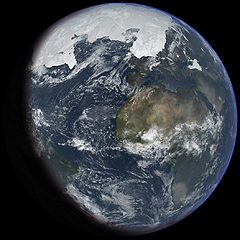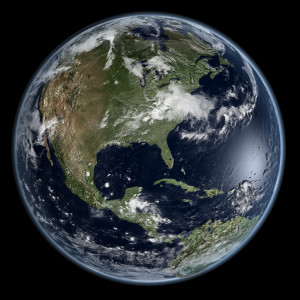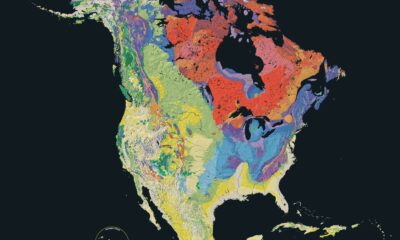Creation Corner
Origin of universe and life

One can speculate without end about the origin of the universe, the earth, and life. That is all evolutionary astronomers and biologists do. Any model of the origin of these things, must explain what they are like today. No one can do this, who rejects the one Historical Record we have from the earliest times. The Hebrew Bible holds that record.
Origin and operational science
Science divides itself into two subject areas. Origins science tries to tell where the universe and everything in it, including life, came from. Operational science tells us how these things work. Operational science stays honest for a simple reason: one can test every theory about how things work. A thing either works or it doesn’t! And if it doesn’t, a theory saying it should work, needs work if it will survive at all. (Recall: a theory tries to explain what we see.) Origins science doesn’t lend itself so readily to such testing. Origins science works more like a police investigation, or a medical diagnosis. But one can still test an origin theory. Any theory, of origin or operation, must predict what one will find, how something will work, or both. An origin theory should also predict what one should not find. So if anyone does find that thing, one must change or throw away the theory.
Scientists in all fields try to find the “theory of everything.” Einstein thought he had this with his Unified Field Theory. Stephen Hawking also thought he had a “theory of everything.” But in fact no one ever has this. At most one has a comprehensive and comprehensible theory to explain as much as it can. More often one has a theory none but a select few can understand.
Origin of the universe
To try to explain the universe, astronomers rely on the Big Bang Theory. Stephen Hawking makes the latest try at it: one particle, smaller than anyone can conceive, blew up and became the space we know today. But why do large objects in the sky seem to rush away from us, and faster as one looks farther away? Why do some of these large objects spin so fast they should fly apart? Those same astronomers come up with “fudges”: “dark energy” (that “pushes” these objects away from us) and “dark matter” (objects heavier than we can appreciate by looking at them).
John Hartnett, in 2007, came up with a simpler way to explain these things. He invented a new theory of physics, that he called cosmological relativity. It treats the speed at which things rush away as another physical dimension. By so doing, he can predict not only the faster retreat of these large objects but also their faster spin. One need not resort to “dark matter” or “dark energy.”
(Which brings up a centuries-old rule of the scientific method: Occam’s Razor. William of Occam, who invented it, put it this way: one does not multiply guesses without good reason. Put another way: one prefers the simplest explanation that fits all the facts.)
But why won’t people accept cosmological relativity? Because that theory also says something stretched the sky. And not only did space stretch. So did time in our galaxy and especially on this earth. That comes too close to things the Hebrew Bible tells us:
- God “stretched out the heavens like a tent.” Seventeen different verses say this.
- This stretching happened not much more than seven thousand years ago.
People don’t want to accept either God or a young universe. (Young by which clock? By our clock, of course. What other clock matters to human beings?) So they desperately cling to the Big Bang Theory, the Hawking Big Atom, “dark energy,” and “dark matter.”
Origin of the solar system
When people speculate on how our solar system came to be, they make worse problems for themselves. The modern Nebula Theory says several large dust clouds, left over from supernovae, collided and somehow stuck together. The dust formed a large disk, which spun as the dust collapsed to form, first the sun, then the planets. One planet didn’t finish forming, and left the asteroid belt. Another planet supposedly failed to form beyond Neptune and left the Kuiper Belt and the Scattered Disk.
[ezadsense midpost]
But how can dust clouds collide? Why wouldn’t the dust particles fly past one another and keep going? Why do two planets in our solar system (Venus and Uranus) spin backwards? To explain that, astronomers speculate about “giant impactors,” one for each planet. One struck Venus and somehow spun it around the wrong way. Another struck the Earth and produced the Moon. Two giant impactors, each the size of Mars, having two radically different effects. For Mercury and Venus, alone among the planets, have no moons.
Origin of the earth

Digital elevation model of Earth with sunlight positioned to approximately 5/30/12 16:50 UTC. Photo: Kevin Gill/Flickr, CC BY-SA 2.0 Generic License
Those wondering about the origin of the earth, must explain where the earth got its water. (They must also explain where the Moon came from; see above.) So where do they say it came from? From comets. Water makes up most of the “stuff” of comets, does it not? Except cometary ice has heavy hydrogen, at twice (or more!) the concentration in the oceans of earth. (Comet 67P/Churyumov-Gerasimenko has 3.4 times as much heavy hydrogen for its weight than do the oceans of earth.) So after an impossibly heavy load of comets dumped their water on earth, a neutron storm broke out and irradiated the solar system. The comets had the most exposure, so they captured most of the neutrons. The atmosphere somehow protected the earth. But why doesn’t the air have an even heavier concentration of heavy nitrogen and heavy oxygen?
Origin of life
And so we come to life. Where did that come from? If one refuses the Bible account, one must choose between two theories:
- Life arose from non-living chemicals in a “primordial soup,” or a “biological ylem.”
- A comet, or comets, “seeded” the earth with the first life forms.
The second theory, of course, begs the question of where those life forms came from. Francis Crick discovered DNA with his graduate student, James Watson. Crick badly wanted to reject the Bible’s Word that God created life. So he and Leslie H. Orgel, in 1973, published a theory even wilder than comet-seeding. According to this, an advanced extraterrestrial race, for whatever motive, fired a brace of missiles, each laden with bacterial and blue-green algal payloads, in all directions. One crashed on earth. And all life on earth descends from these payloads.
Crick soon realized the problems he had with that theory. What kind of missile could make such a trip? How could it keep its payload safe from radiation? How could the payloads survive the crash?
So, like most evolutionists, he turned to abiogenesis – life from non-life – as the answer. But that has its own problems. Why do we not see life spontaneously arising again? What made up this primordial soup?
The evolutionists tell us the same conditions that created the soup and let life spring from it, no longer exist. How convenient. One cannot test their theory. Or can we? They confidently predict life should arise on innumerable worlds orbiting innumerable suns. So where are they? Actually, we should thank God – excuse me – our lucky stars we haven’t seen them. For some of these scientists, Stephen Hawking among them, have expressed fear of the “first contact.” Columbus and the “Indians,” with the roles in reverse, some of them warn.
Still more scientists say life arose on other worlds, but these other civilizations cannot cross the gulf between stars any more than we could. Once again, we cannot test their theory. Not without an advance in physics beyond anyone’s reach.
Evolution and creation: which one can you test?
But all these evolutionists insist the creation scientists invent theories they cannot test. Really? Consider the Hydroplate Theory. That explains many things, from the “geological column” to the Mid-Oceanic Ridges to the frozen mammoths to the widespread deposits of limestone on earth. It also explains many features of our solar system other theories cannot explain. And: one can test it. Walt Brown, who invented the theory, also predicted finding after finding from it. Almost without exception, other scientists have found the things he predicted. How many evolutionists can make the same claim?
Why can the Hydroplate Theory explain so much? Because its inventor embraces the Bible and the history It gives, without reserve. So one must ask: why do people run so far from the Truth, though that makes them even less able to explain the world around them?
Reprinted from examiner.com
[ezadsense leadout]
Terry A. Hurlbut has been a student of politics, philosophy, and science for more than 35 years. He is a graduate of Yale College and has served as a physician-level laboratory administrator in a 250-bed community hospital. He also is a serious student of the Bible, is conversant in its two primary original languages, and has followed the creation-science movement closely since 1993.
-

 Civilization4 days ago
Civilization4 days agoWhy Europe Shouldn’t Be Upset at Trump’s Venezuelan Actions
-

 Executive5 days ago
Executive5 days agoHow Relaxed COVID-Era Rules Fueled Minnesota’s Biggest Scam
-

 Christianity Today4 days ago
Christianity Today4 days agoSurprising Revival: Gen Z Men & Highly Educated Lead Return to Religion
-

 Civilization5 days ago
Civilization5 days agoThe End of Purple States and Competitive Districts
-

 Executive4 days ago
Executive4 days agoWaste of the Day: Can You Hear Me Now?
-

 Civilization1 day ago
Civilization1 day agoTariffs, the Supreme Court, and the Andrew Jackson Gambit
-

 Civilization2 days ago
Civilization2 days agoWhy Europe’s Institutional Status Quo is Now a Security Risk
-

 Civilization3 days ago
Civilization3 days agoDeporting Censorship: US Targets UK Government Ally Over Free Speech















[…] from examiner.com and from Conservative News and […]
Paul Brundage liked this on Facebook.
Evolution is more impossible than the Tooth Fairy, Santa Claus, and the Headless Horseman. See link to lifescienceprize.org for a list of bluffing evolutionists.
Who besides you argues that the solar system was hit by a neutron storm?
Also, since the hydroplane theory requires neutron bombardment of the subterranean water layer, the question about heavy oxygen would apply equally to that theory.
First, I said the solar system suffered a neutron storm if the comets brought Earth its water. And in that case, the atmosphere must have borne the brunt of that storm. The signs in the atmosphere are not consistent with that. I am pointing out a part of the origin of the earth’s water that evolutionary theorists miss.
Second: the Hydroplate Theory says the neutron storm broke out in the earth’s crust and mantle and affected the subcrustal ocean as it was trying to escape. The water, and especially the subcrustal weter, absorbed most of the neutrons. So the water protected the air. NOt completely, because we see some heavy nitrogen and oxygen. But we do not see the heavier proportions we would see if the neutrons came from outside rather than inside.
Just to be clear here, you’re arguing against a theory for the origin of Earth’s D/H ratio that nobody but you has made. Nobody has proposed that Earth and the solar system were subjected to a neutron storm, so the fact that the Earth doesn’t look like it was subjected to a neutron storm is a bit of a hollow victory. Earth also doesn’t look like it was hand-carved from a wad of ambergris vomited up by the Giant Space Whale Protoceleps. Take that, nobody who ever said that it did!
You do have a problem with the Hydroplate theory if you are proposing that neutron bombardment of the underground water produced all the deuterium in Earth’s water, though. This is because neutron bombardment of seawater is much, much better at activating the minerals dissolved in the water than it is at converting hydrogen to deuterium. As an example, the atomic bomb tests in the 50’s showed that it’s a lot easier to produce radioactive chlorine (36Cl, with a half life of about 300000 years) than it is to produce deuterium by the neutron irradiation of seawater. So where’s all the 36Cl that should be left over from an event that purportedly took place only 5000 years ago? Why aren’t the salt domes which Dr. Brown claims are the result of salt precipitating out of the subcrustal water loaded with 36Cl, for example?
Well, now just so you can be crystal-clear: I am arguing in anticipation of a theory that maybe nobody has propounded yet, but you know d___d well somebody will propound, the minute they figure out they’ve got a big fat problem with their current theory. Which is: comets delivered water to the earth, and somehow the water on earth had half the D/H ratio of the cometary ices.
If nobody ever proposed the earth and solar system suffered a neutron storm, then they have left a big gaping hole in their theory of the origins of the earth’s oceans. Or do you want to take a crack at explaining why the comets have twice or even 3.4 times the D/H ratio of the oceans of earth, without a generalized neutron storm in space?
Not sure how make this sound less critical but:
Instead of researching the responses and alternate pre-existing and modified theories, you came up with your own that bears no resemblance and is superficially easy to refute.
Other articles mention possibilities from scientists that study such things and were prepared for this sort of finding without a non-specific neutron storm. They seem to build on the observation that different water ratios exist in different areas of the solar system.
link to space.com
Basically, there are more regions of both comets and asteroids that have evidence of containing or having contained earth-like water.
The sources in the article you linked to, can’t get their story straight. They alleged different comets formed from different regions of the solar system. Now they have to limit the origin of Earth’s water comets to the asteroid belt. I have no other way to put it but this: there’s not enough water in the Belt to spare for the oceans of earth. Nor was there ever.